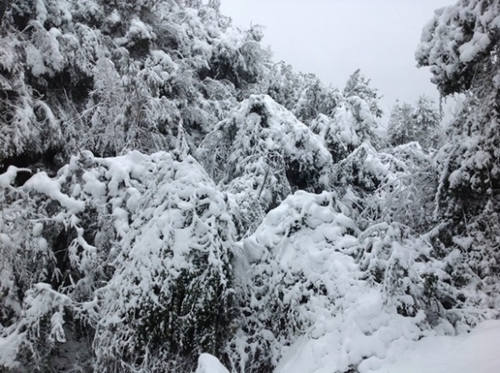
The snow event provided a unique opportunity to directly evaluate how the carbon balance changes in response to damage in primary subtropical evergreen forests.
Researchers from Xishuangbanna Tropical Botanical Garden (XTBG) of the Chinese Academy of Sciences analyzed five years of continuous measurements of CO2 exchange across the biosphere/atmosphere interface in the forest by means of the eddy covariance technique.
The researchers aimed to quantify how exposure to an anomalously heavy snow affected ecosystem processes that determine gross primary productivity and ecosystem respiration, and thus annual net carbon sequestration.
The forest canopy was severely damaged by the heavy snow, and the leaf area index (LAI) decreased significantly from January to July 2015. Gross primary productivity, net ecosystem exchange, and ecosystem respiration all sharply decreased in 2015 after the heavy snow.
They found that the heavy snow caused severe structural damage to the entire canopy with a total gross primary productivity loss of 41% comparing with normal year in the ecosystem.
From January to June in 2015, gross primary productivity and leaf area index were significantly lower than the average of 2011–2014, likely because of a decrease in woody tissue respiration of foliage and stems after the snow damage. Total ecosystem respiration in the first half of 2015 was lower than that in normal years.
Overall, annual net carbon uptake in 2015 was reduced by 76% compared to the mean carbon uptake of the previous four years. A sharp increase in carbon uptake was also observed in 2016, indicating that long-term, continuous measurements should be carried out to evaluate the overall response to the disturbance.
The study entitled "Snow damage strongly reduces the strength of the carbon sink in a primary subtropical evergreen broadleaved forest" has been published in Environmental Research Letters.

Heavy snow occurs at Ailaoshan in 2015 (Image by XTBG)

86-10-68597521 (day)
86-10-68597289 (night)

52 Sanlihe Rd., Xicheng District,
Beijing, China (100864)

